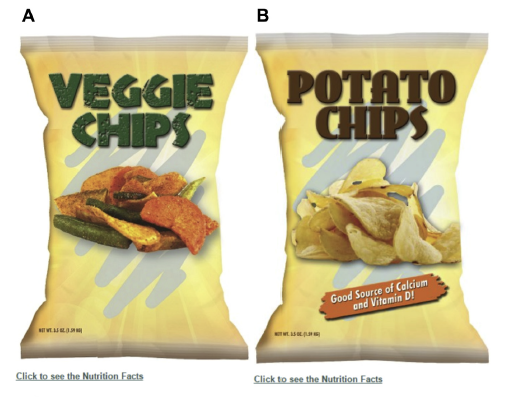It’s no secret that marketing affects the foods we choose, including which foods we think of as more nutritious. Back in 2013, AICR wrote about how the so-called “health halo” effect can make people think organic cookies are lower in calories and all-around healthier than the exact same cookies not labeled organic.
A new study published in the Journal of the Academy of Nutrition and Dietetics finds that this effect may extend to claims about foods with added vitamins and minerals.
For this study, researchers surveyed over 5,000 people who were selected based on age, sex, race, ethnicity, and education to mirror the U.S. population.
Each participant who took the online survey was randomly assigned to view one package of vegetable and one package of potato chips. Chip packages varied in their health claims and in the amount of key nutrients they contained.
Some of the packages featured a healthier nutrition profile, with relatively fewer calories; less total fat, saturated fat, and sodium; and more fiber than the less healthy chips. (See image below.)

If you wanted to buy the healthier product, which of these products would you buy?
Some chip packages participants saw were also fortified with vitamins and minerals. Added nutrients were listed below the ingredients and had higher percent daily values on the Nutrition Facts label. For chips that were fortified, the product sometimes included a nutrient content claim on the front of its package advertising the fortification, such as “Good source of calcium and vitamin D!” Other times, people viewed fortified chips that had no nutrient content claims.
After viewing two bags of chips randomly assigned to them side-by-side, each participant chose which bag of chips they would purchase and which was healthier. They could view the Nutrition Facts labels for both bags of chips before answering each question by clicking on a link below the products.
Participants were 30% less likely to click on the Nutrition Facts label before deciding which bag of chips to purchase if it had a nutrient content claim
The researchers found that nutrient content claims on fortified products influenced whether people clicked on the Nutrition Facts label and which bag of chips they ultimately chose to purchase. Participants were 30% less likely to click on the Nutrition Facts label before deciding which bag of chips to purchase if it had a nutrient content claim.
Those who didn’t look at the Nutrition Facts label were also 21% more likely to choose the product with a nutrient content claim over an identical product without one.
While only 10% of people clicked on the Nutrition Facts label before choosing which product to purchase, those who did weren’t swayed by nutrient content claims and were 5 times more likely to choose the healthier chips compared to those who didn’t look at the label.
Participants were also less likely to correctly identify which product was healthier if the less healthy product included a nutrient content claim, but clicking on the Nutrition Facts label significantly increased the likelihood of correctly identifying the healthier product.
Just because a product is organic, low-fat, sugar-free, or a good source of vitamins and minerals, doesn’t necessarily mean it’s a nutritious choice
The takeaway—when comparing packaged foods, always look at the Nutrition Facts label to get the complete picture. Front-of-package claims only focus on one aspect of a product, typically a positive attribute that marketers want to promote. Just because a product is organic, low-fat, sugar-free, or a good source of vitamins and minerals, doesn’t necessarily mean it’s a nutritious choice.
Better yet, focus on filling your plate with nutrient-dense foods like fruits, vegetables, whole grains, and legumes that don’t need added vitamins and minerals or nutrient content claims.
The study was funded through the US Food and Drug Administration.
For more information on deciphering labels, visit AICR’s Guide to the Nutrition Facts Label.






Very true that marketing affects what we choose. The kids are usually attracted by the colorful packets and tantrums for the same. Along with kids we also eat the same food. Thank you for all the tips shared to practice a clever choice.